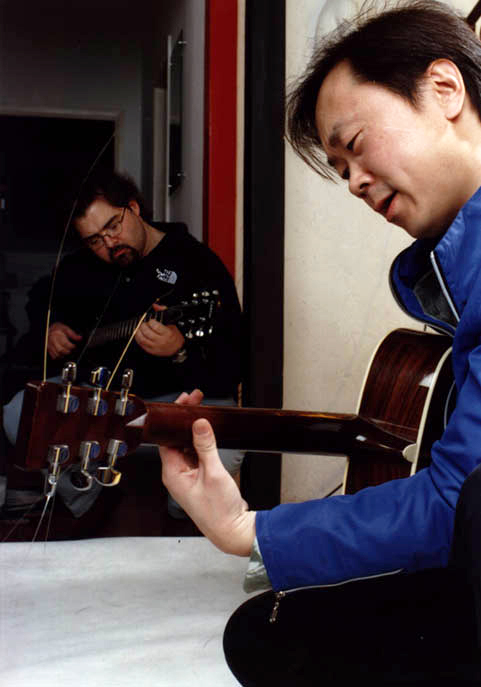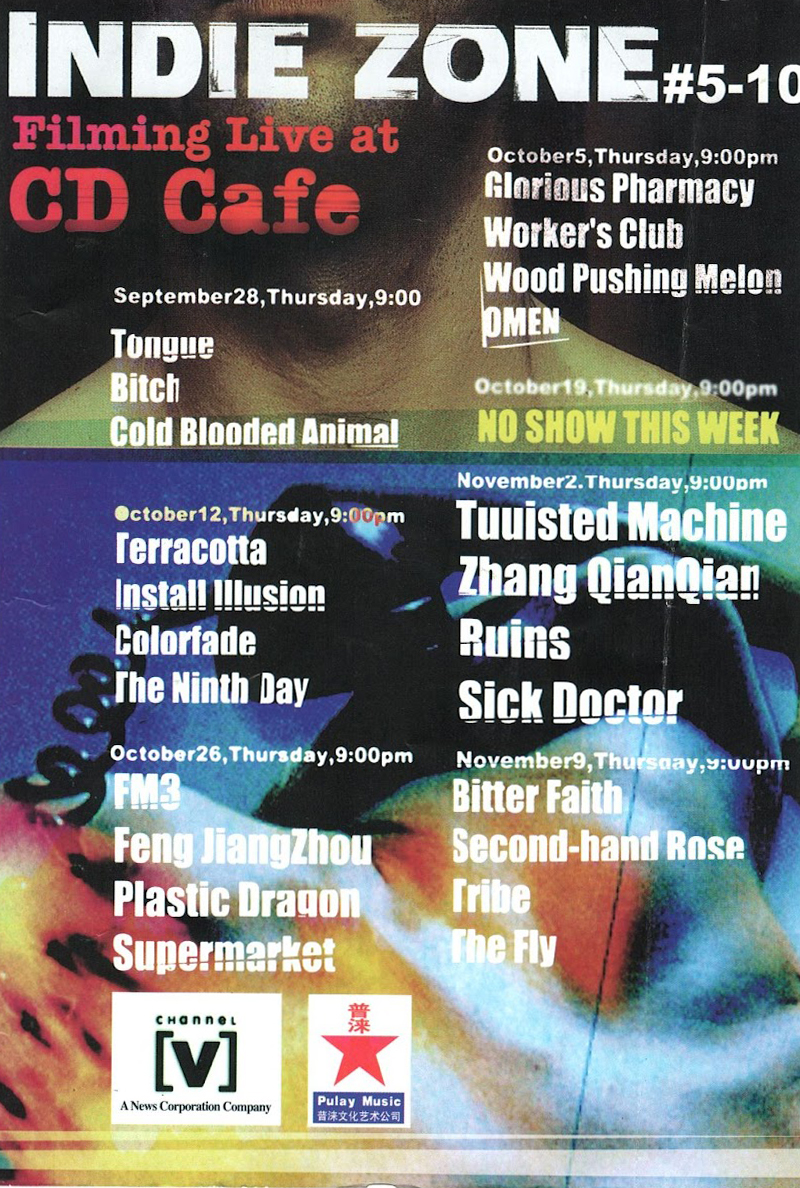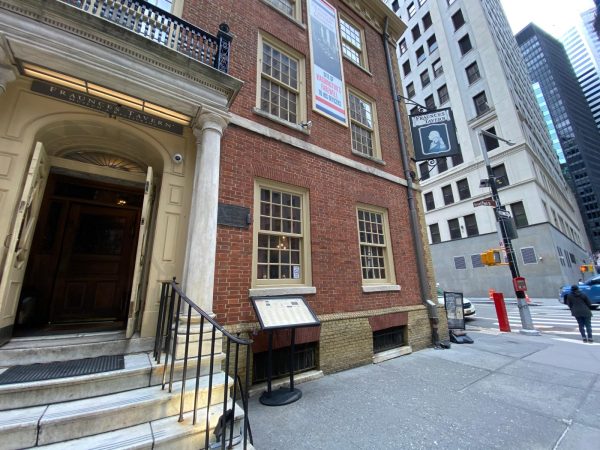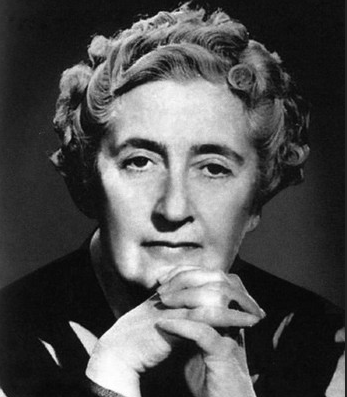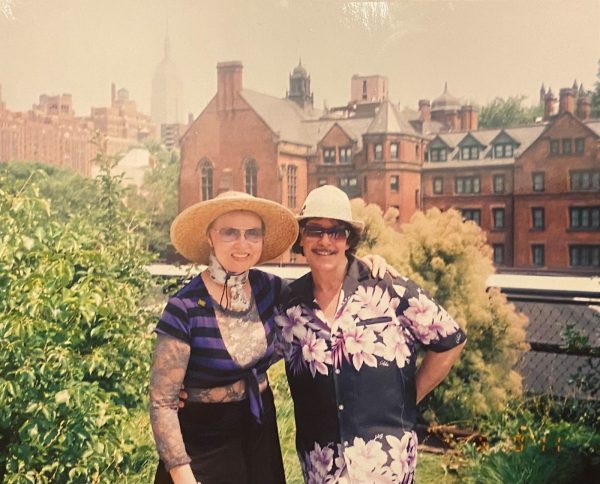Matthew Clark, 柯马修 Kemaxiu: Ten Years in China
A profile of the Bronx Science history teacher with ties to Chinese rock and the international artist Cui Jian.
Matthew Corbin Clark, 柯马修 Kemaxiu.
Mr. Clark is a man of many talents and passions. On one side, he is an esteemed history teacher at Bronx Science, guiding ninth grade minds through ancient and medieval history, and preparing seniors to navigate our government and economy. On the other hand, he is a music producer, crafting Chinese rock music, an homage to his ten years living and working in Taiwan and China. The duality of his life has left a profound impact on his students.
Nushana Alam, ’23, a student of Mr. Clark’s, remarked, “I was so surprised finding out about Mr. Clark’s past. His presentation in class was unexpected. You don’t expect that the government teacher you see every day during 4th period is secretly a rock star with an album out.”
Siddratul Moonthaha ’23, another student of Mr. Clark’s, said, “I think it’s really fascinating how he was able to move between different countries and create his own independent identities there. To have the courage to travel so broadly around the world is very inspiring.”
Mr. Clark’s journey into music started very early on in his life. Growing up in Meaford, Ontario, a tranquil Canadian town in a majority-white “apple-growing region,” he was raised in a big family with a deep appreciation for music. Fueled by this environment, he formed a rock band in high school with eccentric music-loving teenagers from the neighboring town. Soon, Mr. Clark’s love for rock music would go international.
Opting to attend Hamilton College, a small liberal arts college in the United States, Clark heeded his parents’ advice to steer clear of the overwhelming machinery of larger Canadian universities. However, his inner musical calling beckoned. While attending Hamilton, he worked as the campus audio engineer for professional artists performing at the campus pub. Little did he know that he would later mix music for bands that would ascend to fame. This experience jump-started his career in music production, setting the stage for an unbelievable journey.
As Clark went through college, he realized he was getting less out of his classes than everyone else. “The significance of history didn’t truly take hold of me until I lived in another part of the world and lived through history,” he said.
Sensing a need for exploration and growth, he ventured to Taiwan to teach English, following in the footsteps of his parents, who had served in the Peace Corps and Canadian External Aid. When Mr. Clark arrived, Taiwan was in a state of transition, gradually emerging from martial law after the passing of President Chiang Ching-Kuo. It was a time of change, both politically and in Mr. Clark’s personal life.
Immersing himself in Taiwanese culture, Mr. Clark pursued one-on-one Mandarin Chinese language classes while teaching English to sustain himself. During this time, he encountered the profound impact of music as a tool for social change.

On an infamous day in 1989, students protested at Tiananmen Square and adopted as their anthem the song ‘Nothing to My Name’ by the emerging musical artist, Cui Jian 崔健. Cui Jian’s powerful lyrics resonated deeply with the Chinese youth, encapsulating their frustrations and aspirations for a brighter future at a turbulent time when China was experiencing dramatic change.
Upon completing his bachelor’s degree, Mr. Clark enrolled at the Johns Hopkins-Nanjing University Center for Sino-American Studies in Nanjing, China. Students from the P.R.C. and the U.S.A. lived together and learned under one roof in a university, the likes of which had never been seen before within China’s borders, making this an unprecedented moment. At this time, Chinese nationals and Westerners were not allowed to cohabit. As fate would have it, Mr. Clark’s roommate was a huge fan of Cui Jian, who imparted to Mr. Clark the significance this artist’s music had on the new generation of Chinese youth.
It was here that destiny began to unfold. Saving up money, Mr. Clark diligently sent out résumés to manufacturers of musical production equipment. This led him to a position in Hong Kong where he was responsible for importing and marketing electronic music gear in China, where he came into direct contact with Cui Jian.
A sequence of connections eventually prompted Mr. Clark to reach out to his musical hero, a renowned producer in New York City named Bill Laswell, who was coincidentally scheduled to play a show in Cui Jian’s hometown of Beijing on the same date that Mr. Clark would be sent there on business.
Laswell’s innovative contributions to the music industry made him an inspiration for Mr. Clark’s artistic aspirations. Mr. Clark took hold of his destiny and found a way to contact Cui Jian’s and Bill Laswell’s managers, hoping they could meet and launch a project together.
Miraculously, in 1994 all three paths aligned in Beijing, leading to a momentous meeting during which Mr. Clark met his hero and befriended China’s biggest rock star.
As a result, Cui Jian collaborated with Mr. Clark for several years until in 1999 Cui hired him to manage his North American tour. Recognizing Clark’s capacity to handle a Chinese musical artist in a western professional environment, Cui invited Mr. Clark to move to Beijing, ship over his recording studio, and work as Cui’s international manager and in-house producer. This was Mr. Clark’s dream come true, and he eagerly accepted.
During his tenure with Cui, Mr. Clark managed two tours of Europe and forged many new relationships for the singer in the western music industry, as well as with foreign governments and the press. Yet most significant was the opportunity to orchestrate a weekly live music festival broadcast on Channel V, Hong Kong’s pan-China version of MTV. This event drew countless new bands eager to perform in Beijing, and offered Mr. Clark a unique opportunity to discover and record raw talent hidden within the Chinese cultural scene.
It was a transformative experience as it gave Mr. Clark the chance to produce his first Chinese rock album, which he single-handedly produced and engineered over a 12-month period: 北京 Beijing Band 2001: New Rock Bands from the People’s Republic of China. The project launched the careers of several unknown acts that are now national stars in China. It was also later featured in PBS Frontline’s documentary ‘China In The Red’, allowing Clark to release the record internationally.
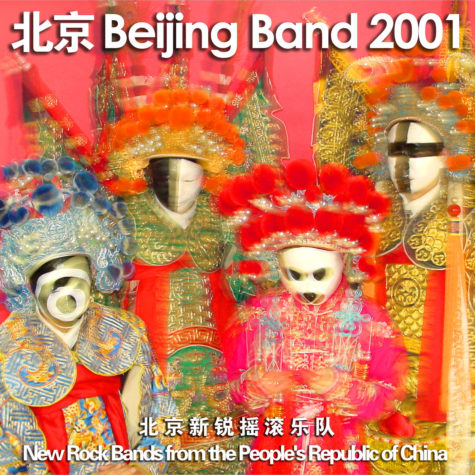
Working for Cui Jian was an incredibly exciting chapter in Mr. Clark’s life, marked by significant artistic collaboration and international cultural exchange. However, it eventually became clear that the enterprise would never produce a sustainable living, and Mr. Clark eventually made the decision to return home to the United States.
Resettling in New York, Mr. Clark pursued graduate studies, enrolling at Columbia and Stony Brook to earn two master’s degrees and a teaching license. His diverse experiences in the private sector and his long-demonstrated passion for education finally converged as he embarked on a career as a history teacher in New York City, eventually landing a position right here at Bronx Science. Mr. Clark’s ability to connect with students through his lived knowledge and shared love for music has made him a beloved figure in the classroom.
Alexander Rush Barnes, ’23, a student of Mr. Clark’s, said, “It was interesting to see the twists and turns and ‘what ifs’ he had, before he became as a teacher.”
“He had such an eventful life and got to meet so many different people all around the world before coming to teach us. It was so cool to hear about how he lived through more experiences than most people have,” Elizabeth Colón ’23 added.
In 2012, Mr. Clark’s musical ambitions culminated in the release of an album created with his “simple guitar, bass, and drums band,” SPED, formed with two other teachers at DeWitt Clinton High School. The record was produced in the comfort of Mr. Clark’s home and features two versions of each song. One version is in American English, and the other in Mandarin Chinese, hence the title, 北京 Beijing Band 2012: 美汉语 AMERICAN MANDARIN.
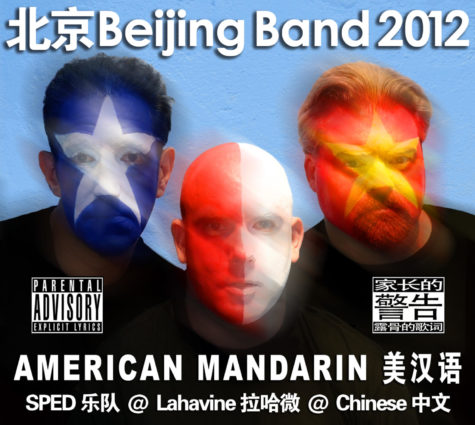
Mr. Clark worked hard to preserve the essence and intentions of the original songs, coincidentally written by Bronx Science alumnus, Jeff Levine ’83, who at the time was a fellow colleague of Mr. Clark’s while they both taught at DeWitt Clinton. Mr. Clark’s theory for translating the lyrics into Chinese was to maintain the rhyming schemes while keeping the original meaning of Levine’s lyrics. Given the political nature of the songs, Mr. Clark has observed that Chinese listeners sometimes feel uncomfortable with the effect of his trans-lingual singing. Nonetheless, he thinks this is precisely the artistic endeavor that makes sense for him, given his personal experiences in both Chinese and American cultures.
Mr. Clark has plans for a third 北京 Beijing Band record, but laments that the time does not seem ripe to return to China for such experimentation. Meanwhile, he is recording his own music and hopes to finalize an album of new songs before the end of 2025. Nevertheless, Mr. Clark wishes to continue teaching at Bronx Science. “I feel lucky every day to teach at this school,” said Mr. Clark. “The commitment of the students to learning about the world, coupled with the culturally diverse student body, makes my work here feel important and fulfilling.”
Mr. Clark’s latest record can be listened to for free at www.beijingband.com.
“The significance of history didn’t truly take hold of me until I lived in another part of the world and lived through history,” Matthew Clark said.
Fairuz Omar Raya is a Features Editor and Instagram Editor for ‘The Science Survey.' She believes that journalism is a privilege that allows voices to...

